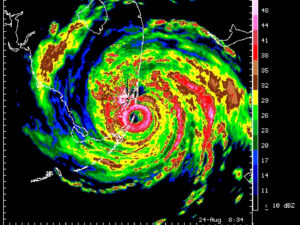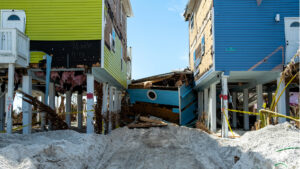By Jim Gross

More than 30 years ago, Hurricane Andrew blasted across South Florida, arriving as a Category 5 hurricane. Andrew caused massive wind damage, particularly in Miami Dade County, killing 44 people and causing $25 billion in damage while crossing the Florida peninsula. More than 930,000 policyholders in South Florida lost coverage after 11 insurance companies went bankrupt.
But we did learn from this catastrophe? Gov. Lawton Chiles established the Florida Building Codes Study Commission in 1996. The commission found that building codes were developed, amended and administered by over 400 local jurisdictions and state agencies.
The Florida Building Code was established in 1998. It phased out local laws and regulations and replaced them with universal statewide building codes. A study conducted by the University of Florida in 2005 noted that homes built under the new universal Florida Building Code sustained less damage from hurricanes than those before the code became effective.
Hurricane Ian hit Florida in September 2022. It was a horse of a different color. While wind damage was certainly significant, storm surge and flooding were even more significant.

Ken Graham, the director of the National Weather Service, commented that “Hurricane Ian’s intense flooding across Florida is indicative of what we’ll see more of in the future. Climate change is fueling more intense rainfall at the coast and inland, and with sea level rise, higher storm surge associated with hurricanes and tropical storms.”
A few years ago, I was invited to participate in a panel session at the annual Everglades Coalition Conference. The session theme was, “Buy the Land: How will Florida Spend the Constitutional Land Acquisition Trust Fund Money?”
I took a somewhat different tack with some of my comments. While climate change and sea level rise certainly represented a threat to Florida, I suggested that they also represent an opportunity. Coastal lands would be abandoned as residents progressively retreat inland and upland.

Florida could establish a new program to acquire those lands and restore them as conservation lands. These lands would serve as a buffer from intense storms as well as providing expanded recreational opportunities. Restricting or totally eliminating development in low-lying areas would also significantly reduce the inevitable liability and costs associated with future storms.
Resilience is a popular theme these days. Why not build on this theme with forward-thinking and sound planning? Once again, under the leadership of Florida’s governor, state and local government agencies could work together to make Florida safer and more resilient.
We learned lessons in the aftermath of Hurricane Andrew. There is no reason we cannot learn lessons from Hurricane Ian.
Jim Gross is executive director of Florida Defenders of the Environment. This piece was originally published in The Monitor, the organization’s newsletter. Editor’s note: This piece has been corrected to indicate that Andrew made landfall as a Category 5 hurricane.



